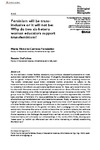Mostrar o rexistro simple do ítem
Feminism will be trans-inclusive or it will not be: Why do two cis-hetero woman educators support transfeminism?
| dc.contributor.author | Carrera-Fernández, María Victoria | |
| dc.contributor.author | DePalma, Renée | |
| dc.date.accessioned | 2024-02-05T13:42:16Z | |
| dc.date.available | 2024-02-05T13:42:16Z | |
| dc.date.issued | 2020 | |
| dc.identifier.citation | Carrera-Fernández, M. V., & DePalma, R. (2020). Feminism will be trans-inclusive or it will not be: Why do two cis-hetero woman educators support transfeminism? The Sociological Review, 68(4), 745-762. https://doi.org/10.1177/0038026120934686 | es_ES |
| dc.identifier.issn | 0038-0261 | |
| dc.identifier.uri | http://hdl.handle.net/2183/35396 | |
| dc.description.abstract | [Abstract] As two cis-hetero woman feminist educators, we provide an educator’s perspective on trans-exclusionary radical feminist (TERF) discourses. We begin by discussing the heterosexual matrix and the gender violence that it produces in schools as well as other socializing institutions. The socially constructed sexual binary constrains identity production to adhere to the heteronormative, at the same time excluding those who transgress this normativity. We continue by reviewing how schools are particularly significant spaces for these early social interactions, but the social discourses enacted in educational contexts mirror those of broader society. We then critically analyse some of the increasingly belligerent popular discourses promoted by TERF groups since the 1970s, appropriating feminist discourses to produce arguments that contradict basic premises of feminism. We trace possibilities for a collaborative response by reinforcing alliances between transfeminism and other feminist movements. Finally, as teacher-educators, we highlight among these a critical (queer) pedagogy that incorporates trans* experience as part of a broader feminist educational agenda: to contribute to the creation of a more equitable society based on critical reflections on the gender normative. Such a pedagogy not only rejects trans-exclusionary discourses that serve to reinforce hierarchies and promote violence, but embraces trans* experience as a productive educational resource for understanding human diversity. Human experience that challenges the sexual binary can help educators to critically question the heteronormative and to broaden our understandings; in the words of Eric Rofes, drawing upon ‘status queer’ to ‘rethink our efforts and our role in either maintaining or radically transforming the status quo’. | es_ES |
| dc.language.iso | eng | es_ES |
| dc.publisher | Sage | es_ES |
| dc.relation.uri | https://doi.org/10.1177/0038026120934686 | es_ES |
| dc.rights | Atribución-NoComercial-SinDerivadas 3.0 España | es_ES |
| dc.rights | Under Sage's Green Open Access policy, the Accepted Version of the article may be posted in the author's institutional repository and reuse is restricted to non-commercial and no derivative uses | es_ES |
| dc.rights | © The Author(s) 2020 | es_ES |
| dc.rights.uri | http://creativecommons.org/licenses/by-nc-nd/3.0/es/ | * |
| dc.subject | Critical pedagogy | es_ES |
| dc.subject | Heteronormativity | es_ES |
| dc.subject | Queer pedagogy | es_ES |
| dc.subject | TERF | es_ES |
| dc.subject | Transfeminism | es_ES |
| dc.title | Feminism will be trans-inclusive or it will not be: Why do two cis-hetero woman educators support transfeminism? | es_ES |
| dc.type | info:eu-repo/semantics/article | es_ES |
| dc.rights.access | info:eu-repo/semantics/openAccess | es_ES |
| UDC.journalTitle | The Sociological Review | es_ES |
| UDC.volume | 68 | es_ES |
| UDC.issue | 4 | es_ES |
| UDC.startPage | 745 | es_ES |
| UDC.endPage | 762 | es_ES |
Ficheiros no ítem
Este ítem aparece na(s) seguinte(s) colección(s)
-
GI-ECIGAL - Artigos [16]






